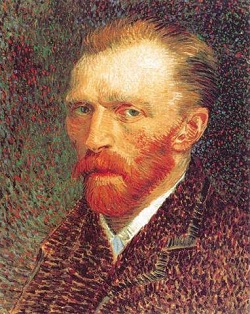From ‘Starry Night’ to ‘Sunflowers’, Vincent van Gogh’s iconic style of painting is instantly recognisable.
While van Gogh was praised as a genius after his death, his mental stability has long been a subject of debate.
Medical professionals and art historians have now concluded that van Gogh suffered from a form of psychosis, although they could not pinpoint the underlying cause of his mental illness.
The theory comes from a group of 35 international psychiatrists, doctors and art historians.
The experts debated their ideas, which were sometimes ‘fierce’, according to Louis van Tilborgh, a professor of art history.
Mr Tilborgh said ‘It’s difficult to make a diagnosis, so the real progress we’ve made is that specialists in the field are talking about it, and they’ve never done this before.’
Van Gogh was born in 1853, and died in 1890 of a gunshot wound, which was apparently self-inflicted.
His illness has been the subject of much speculation, with some people suggesting he suffered from bipolar disorder, or schizophrenia, highlighting incidents such as when he cut off his own ear.
Now for the first time, the Van Gogh Museum gathered all the medical evidence of his case, as well as some personal letters, to provide the panel of experts a basis for their debate.
The findings were presented to the group by Arko Oderwald, a lecturer in philosophy and medical ethics.
He said that the experts had ruled out a number of mental illnesses, and instead, suggested that van Gogh had suffered from psychotic episodes.
They did not give an explanation for the underlying cause of this mental illness.
Mr Werner Strik, a professor of psychiatry and director, said: ‘Psychosis is a syndrome, a combination of symptoms.
‘The essential symptoms for psychosis that we agreed on that he had were hallucinations, acoustic hallucinations, optical hallucinations and also delusions, hyper-excitation, incoherent speech and unclear memory about the episodes.’
He added that the evidence suggests that van Gogh did not suffer from schizophrenia, because ‘schizophrenia is a long-lasting, chronic disease without insight, without introspection, without the fear of relapse.’
This does not fit the profile of van Gogh’s illness, he said.
Source: Daily mail
N.H.Kh

